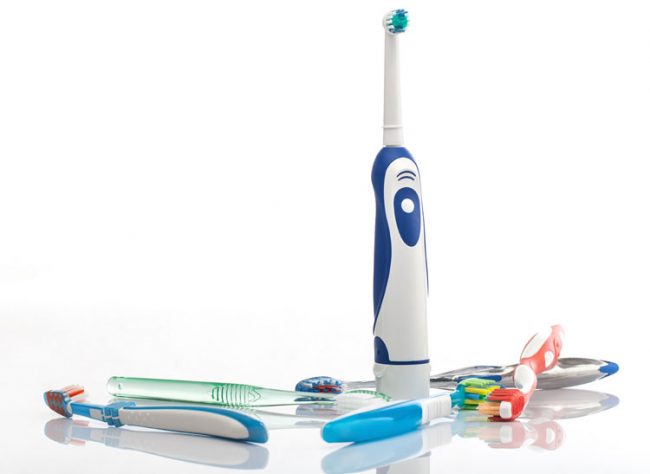Brushing your teeth regularly and correctly ultimately determines the fate of your teeth and gums. In order to maintain good oral hygiene, the American Dental Association recommends brushing twice a day.
With this in mind, you go to the store to select a toothbrush and find an entire aisle of brushes of every shape, size and color. So which one is right for you? First you have to ask yourself if you would prefer an electric or manual brush. Is there a difference in results from one or the other?
Most dentists agree that the key determining factor in whether or not brushing is effective lies in the method more than the instrument. Electric toothbrushes rotate and oscillate which frees you from having to make this motion while manually brushing.
The freedom from that movement may be easier for a person with arthritis or who has a hard time holding a brush at that angle for very long.
Another thing to consider are simplistic fringe benefits of some electric brushes. Some include features such as timers or counters that indicate when a person have focused enough time in each particular area. However this same effect can be easily achieved by forming good habits and exercising good brushing methods.

Some electric brushes have a pressure indicator which helps to prevent brushing too hard which can cause tooth abrasion and damage gums. Once again, this is not a factor if you select a brush with the right style of bristles and use good brushing techniques.
Manual brushes offer a wide variety of styles when it comes to bristles. Your goal is to select the brush that feels comfortable and allows you to most effectively clean your teeth, paying particular attention to hitting all of the hard to reach areas where plaque can hide.
Take into consideration that the ADA recommends replacing your brush or electric brush head every 2-3 months. Manual brushes are often easily replaced and allow you more variety when adjusting the texture of bristles based on professional recommendation and personal observation of gum health.
The cost of electric toothbrushes may influence your decision as well. Electric toothbrushes may be costly and replacement heads may exceed the price of a new manual brush. Batteries are not cheap either and require replacement as well.
One of the main drawbacks to the manual brush comes from not brushing long enough. The other obstacle seems to be determining the right amount of pressure. The main issue with electric toothbrushes seems to be the price and the cost of upkeep.
So regardless of your choice, it is important to keep in mind that neither an electric or manual toothbrush will single-handedly maintain healthy gums and sparkling white teeth. The real results are determined by you and your ability to set a regular schedule, to brush thoroughly in each area for the correct amount of time.
As is always the case with selecting dental hygiene products, it only helps to secure peace of mind when making a selection to consult a dentist or licensed professional.
Dr. David Redford, DDS is a dentist and blogger for http://www.universitydentalarts.com

